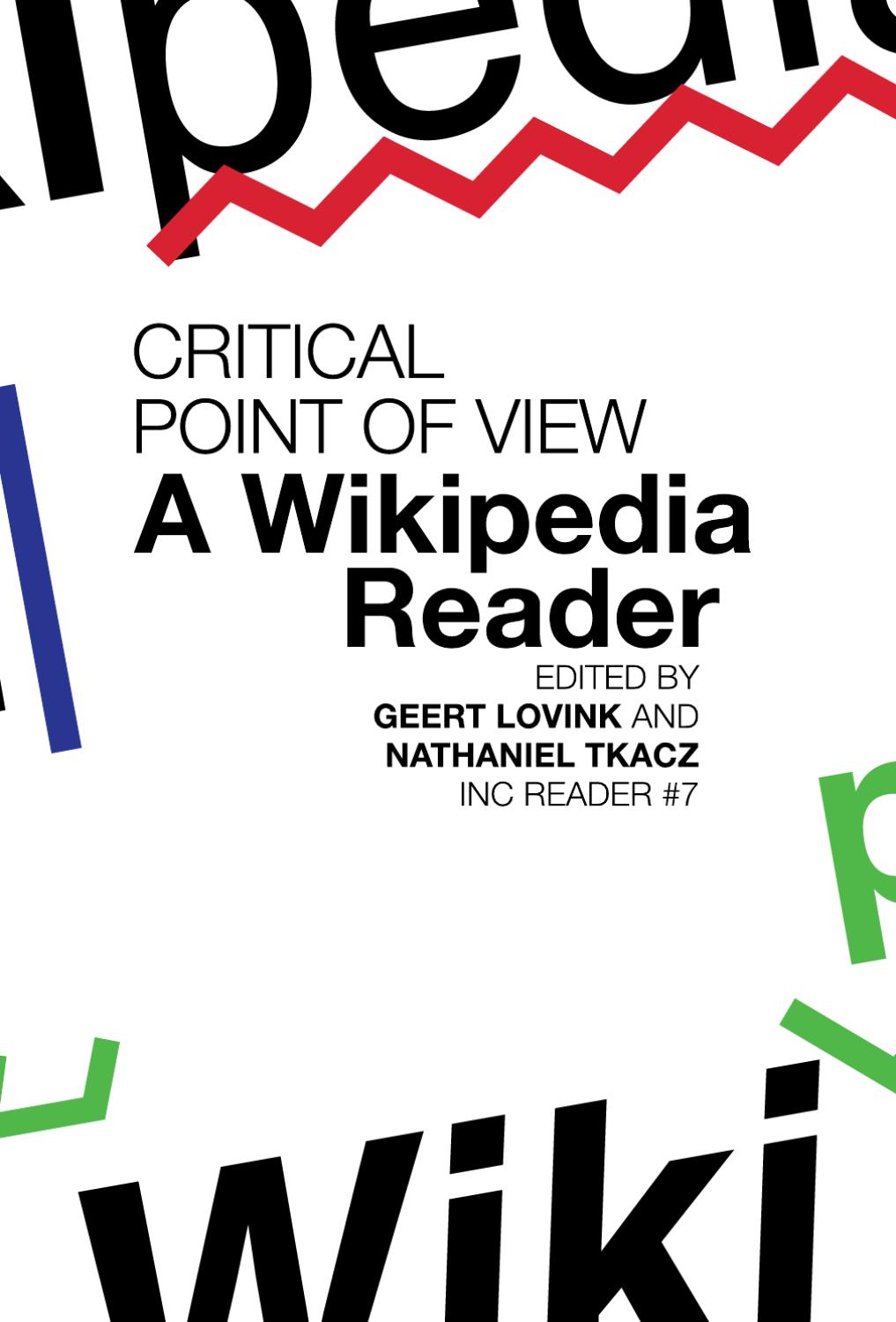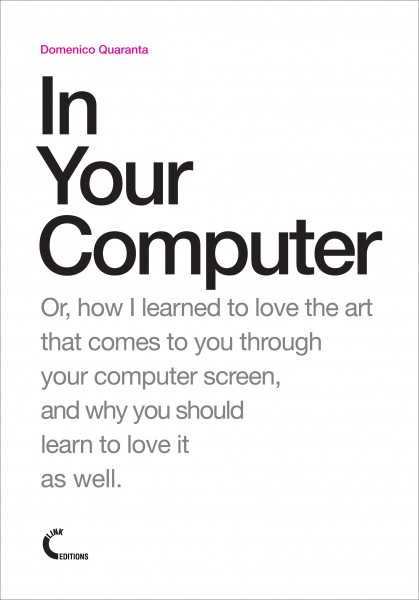Geert Lovink, Nathaniel Tkacz (eds.): Critical Point of View: A Wikpedia Reader (2011)
Filed under book | Tags: · collaboration, internet, knowledge, wikipedia

“For millions of internet users around the globe, the search for new knowledge begins with Wikipedia. The encyclopedia’s rapid rise, novel organization, and freely offered content have been marveled at and denounced by a host of commentators. Critical Point of View moves beyond unflagging praise, well-worn facts, and questions about its reliability and accuracy, to unveil the complex, messy, and controversial realities of a distributed knowledge platform.
The essays, interviews and artworks brought together in this reader form part of the overarching Critical Point of View research initiative, which began with a conference in Bangalore (January 2010), followed by events in Amsterdam (March 2010) and Leipzig (September 2010). With an emphasis on theoretical reflection, cultural difference and indeed, critique, contributions to this collection ask: What values are embedded in Wikipedia’s software? On what basis are Wikipedia’s claims to neutrality made? How can Wikipedia give voice to those outside the Western tradition of Enlightenment, or even its own administrative hierarchies? Critical Point of View collects original insights on the next generation of wiki-related research, from radical artistic interventions and the significant role of bots to hidden trajectories of encyclopedic knowledge and the politics of agency and exclusion.”
Contributors: Amila Akdag Salah, Nicholas Carr, Shun-ling Chen, Florian Cramer, Morgan Currie, Edgar Enyedy, Andrew Famiglietti, Heather Ford, Mayo Fuster Morell, Cheng Gao, R. Stuart Geiger, Mark Graham, Gautam John, Dror Kamir, Peter B. Kaufman, Scott Kildall, Lawrence Liang, Patrick Lichty, Geert Lovink, Hans Varghese Mathews, Johanna Niesyto, Matheiu O’Neil, Dan O’Sullivan, Joseph Reagle, Andrea Scharnhorst, Alan Shapiro, Christian Stegbauer, Nathaniel Stern, Krzystztof Suchecki, Nathaniel Tkacz, Maja van der Velden
Editorial Assistance: Ivy Roberts and Morgan Currie
Publisher: Institute of Network Cultures, Amsterdam, May 2011
INC Reader, 7
Creative Commons Attribution ShareAlike 3.0 Unported License
ISBN 9789078146131
385 pages
Domenico Quaranta: In Your Computer (2011)
Filed under book | Tags: · art, biotechnology, curating, internet, interview, media art, media theory, net art, new media, software art, technology, video games

This book is a collection of texts written by Domenico Quaranta between 2005 and 2010 for exhibition catalogues, printed magazines and online reviews: a pocket version of what the author would save from the universal flood, in a world without computers. It documents most of the fields of research he has focused on critically: from Net Art to Software Art and videogames, from biotechnologies to the debate around curating and the positioning of New Media Art in the contemporary landscape, and back to Net Art again.
This itinerary is traced through a selection of essays, monographic texts and interviews with artists and curators, in no particular order: from Eva and Franco Mattes to Casey Reas, from UBERMORGEN.COM to Oliver Laric, from Cory Arcangel to Tale of Tales, from Jon Ippolito to Gazira Babeli.
As the author writes in the introduction: «We are in the midst of a major change. At the end of the process, not only the way we live, work, travel and communicate, but also the political and economical structures and the social organization we are used to will probably be fundamentally different from how they are now. In art, this change will be complete when the way we make, circulate and understand art is completely different from the way we do it now; and when the way we understand the difference between copies and original and between art and non-art will have adapted to the new models created by the information age. The most we can do now is to take our time, adapt to our new living conditions, be aware of the process going on and look to the most radical propositions around for signals of what is to come. In the awareness that we probably don’t have to look that far: these signals are already here, in our computers.»
Translation and editing: Anna Rosemary Carruthers
Publisher: LINK Editions, Brescia 2011.
ISBN: 978-1-4467-6021-5
180 pages
Licensed under the Creative Commons Attribution-NonCommercial-ShareAlike 3.0 Unported License.
publisher
lulu.com
via Domenico Quaranta
Oliver Ressler: Alternative Economics, Alternative Societies (2005)
Filed under catalogue | Tags: · capitalism, economics, politics, serbia, society, utopia

The exhibition “Alternative Economics, Alternative Societies” focuses on diverse concepts and models for alternative economies and societies, which all have in common a rejection of the capitalist system of rule. In the specific context of Serbia and Montenegro, which is facing one of the most “painful” processes of transition and “predatory” capitalism implementation in the region, this art exhibition by Oliver Ressler offers solutions and examples of concrete models of political and social organizing realized in different parts of the world and in different historical epochs. In the context of extremely right-wing politics in Serbia and these incredibly fast economic transformation processes, there is a conviction that the exhibitions have the potential to appeal on questioning and rethinking the local system of rule and to create the bases for thinking about social and economic alternatives.
Contributions by kuda.org, Kristian Lukić, Marina Gržinić, Oliver Ressler, Brian Holmes
Editor: New Media Center_kuda.org
Publisher: Revolver – Archiv für aktuelle Kunst, Frankfurt, Germany, 2005
ISBN 3-86588-123-8
36 pages
All texts are published under Creative Commons Attribution-NonCommercial-ShareAlike 2.0 license unless otherwise indicated.

